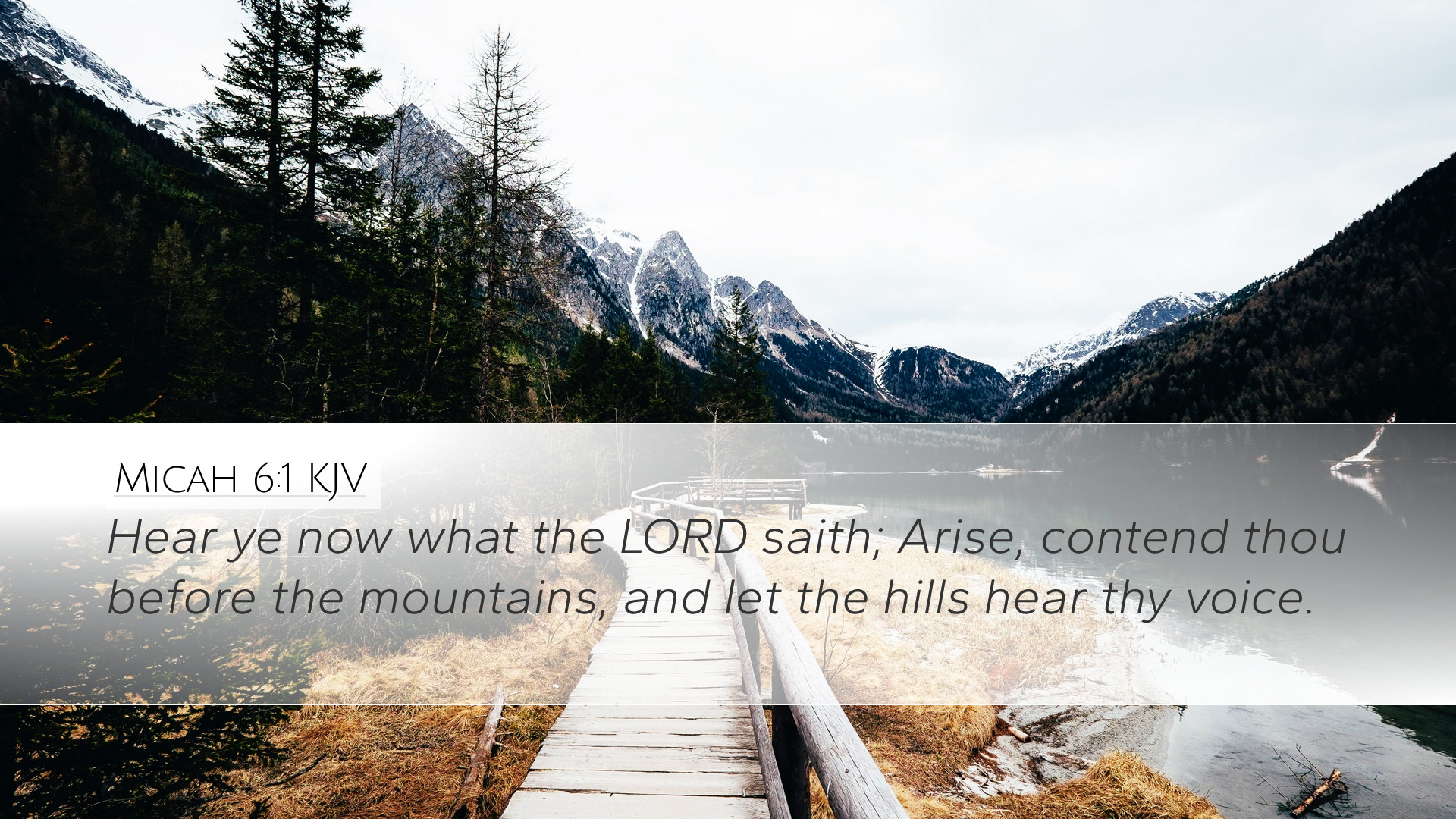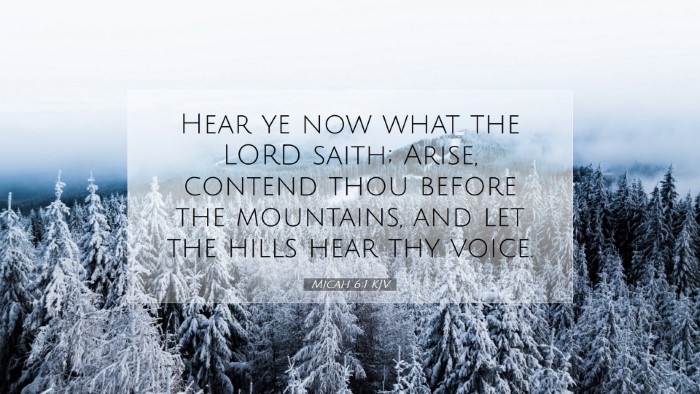Old Testament
Genesis Exodus Leviticus Numbers Deuteronomy Joshua Judges Ruth 1 Samuel 2 Samuel 1 Kings 2 Kings 1 Chronicles 2 Chronicles Ezra Nehemiah Esther Job Psalms Proverbs Ecclesiastes Song of Solomon Isaiah Jeremiah Lamentations Ezekiel Daniel Hosea Joel Amos Obadiah Jonah Micah Nahum Habakkuk Zephaniah Haggai Zechariah MalachiMicah 6:1
Micah 6:1 KJV
Hear ye now what the LORD saith; Arise, contend thou before the mountains, and let the hills hear thy voice.
Micah 6:1 Bible Commentary
Commentary on Micah 6:1
Verse: "Hear ye now what the Lord saith; Arise, contend thou before the mountains, and let the hills hear thy voice."
Introduction
Micah 6:1 initiates a dramatic courtroom scene where the Lord calls upon the creation itself to witness the unfolding dispute between Him and His people. This verse lays the foundation for the prophet’s subsequent message, which addresses issues of justice, mercy, and righteousness that are central to God's covenant with Israel.
Contextual Background
Micah prophesied during a turbulent time in Israel's history, marked by social injustice and spiritual decay. The northern kingdom of Israel had fallen to Assyrian captivity, and the southern kingdom of Judah was drifting into moral decay. The prophet Micah speaks not only as a spokesman of God but also as a mediator who passionately appeals to both the people and their Creator.
Analysis of Key Phrases
-
"Hear ye now what the Lord saith"
This invitation signifies the importance of divine revelation. Emphasizing "hear" implies that God desires His people to listen attentively to His words, indicating the seriousness of their accountability to divine standards (Barnes).
-
"Arise, contend thou before the mountains"
The command to arise suggests urgency; it is a call to action. The mountains symbolize a permanent and immutable witness to God’s case against His people, illustrating that the nature of God's justice is steadfast and unwavering (Henry).
-
"let the hills hear thy voice"
The imagery of summoning the hills points to the vastness of the covenant community. It conveys that all creation is involved in the divine dialogue, thereby emphasizing the weight of the charges laid against Israel (Clarke). This broad audience underscores God’s desire for transparency in His dealings with humanity.
Theological Implications
Micah 6:1 raises profound theological themes pertinent to covenant theology. God’s challenge to Israel through creation invites a reflection on His righteousness and the judgments upon His people. In a broader sense, it encapsulates the call to accountability — a reminder that God hears the cries of the oppressed and desires justice (Henry).
-
Divine Judgment:
This verse foreshadows the impending judgment of God and serves as an exhortation to acknowledge their failures. God stands as a witness before the mountains — signifying the omnipresence of His observation on human conduct (Barnes).
-
Covenant Responsibilities:
The call to contend emphasizes the covenant relationship where Israel is held responsible to abide by God's statutes. This contention is not merely legal but relational, calling Israel back into communion with their Creator (Clarke).
Practical Applications
For pastors and theologians, Micah 6:1 serves as a clarion call to embrace accountability within the community of faith. There are pressing applications concerning social justice, integrity in worship, and the need for genuine repentance:
-
Listen Attentively:
We are reminded to listen actively to God’s voice within His Word. Ignoring His admonitions leads to serious consequences and a disconnection from His will (Barnes).
-
Vocal Advocacy:
The call to "contend" challenges believers to raise their voices for justice and righteousness. This extends to both personal conduct and corporate engagement as the church seeks to reflect God's justice in society (Clarke).
-
Creation as Witness:
Recognizing creation as a witness encourages believers to consider the broader implications of their actions on the environment and society. Our relationship with God directly affects how we relate to one another and the world around us (Henry).
Conclusion
Micah 6:1 is a pivotal verse that not only calls attention to the spiritual state of Israel but also presses upon believers to hear God's word, respond in action, and recognize their part in the larger narrative of justice and righteousness. It resonates through history, urging every generation to examine their faithfulness to the covenant responsibilities entrusted to them. This prophetic call remains relevant today, reminding us of the unyielding nature of God’s justice and the ever-present need for His people to respond in faithfulness.


